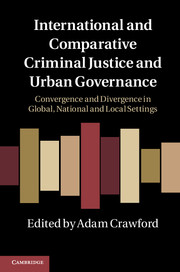 International and Comparative Criminal Justice and Urban Governance
International and Comparative Criminal Justice and Urban Governance Book contents
- Frontmatter
- Contents
- List of figures
- List of tables
- Notes on contributors
- Acknowledgements
- 1 International and comparative criminal justice and urban governance
- PART 1 International criminal justice
- 2 Unintended justice: the United Nations Security Council and international criminal governance
- 3 The International Criminal Court and the state of the American exception
- 4 Universal crimes, universal justice? The legitimacy of the international response to genocide, crimes against humanity and war crimes
- 5 Locating victim communities within global justice and governance
- 6 Dealing with war crimes in Bosnia: retributive and restorative options through the eyes of the population
- 7 Shaping penal policy from above? The role of the Grand Chamber of the European Court of Human Rights
- PART 2 Comparative penal policies
- PART 3 Comparative crime control and urban governance
- Index
- References
3 - The International Criminal Court and the state of the American exception
from PART 1 - International criminal justice
Published online by Cambridge University Press: 05 June 2011
- Frontmatter
- Contents
- List of figures
- List of tables
- Notes on contributors
- Acknowledgements
- 1 International and comparative criminal justice and urban governance
- PART 1 International criminal justice
- 2 Unintended justice: the United Nations Security Council and international criminal governance
- 3 The International Criminal Court and the state of the American exception
- 4 Universal crimes, universal justice? The legitimacy of the international response to genocide, crimes against humanity and war crimes
- 5 Locating victim communities within global justice and governance
- 6 Dealing with war crimes in Bosnia: retributive and restorative options through the eyes of the population
- 7 Shaping penal policy from above? The role of the Grand Chamber of the European Court of Human Rights
- PART 2 Comparative penal policies
- PART 3 Comparative crime control and urban governance
- Index
- References
Summary
It is almost a cliché to argue that while European governments favour a world order based on international law and organisation, Americans see international society as an epiphenomenon of American power. Robert Kagan (2003: 3) famously captured this when, at the height of the Iraq War controversy, he wrote that ‘Americans are from Mars and the Europeans are from Venus’. Where the latter were ‘realising Immanuel Kant's “perpetual peace”’, the former was ‘mired in history, exercising power in an anarchic Hobbesian world where international law and rules are unreliable, and where true security and the defense and promotion of a liberal order still depend on the possession and use of military might’. Chastened by what America found (or did not find) in Iraq, Kagan seemingly stepped back from some of the implications of this analysis. The USA, he concluded, could not and should not ignore the question of legitimacy and the role that law played in providing that. The USA must realise, moreover, that it could not claim legitimacy by acting unilaterally in its self-interest and without reference to the greater good (Kagan 2004). Yet even after recognising this, Kagan argued, the two continents would remain politically divided. That schism might not reflect the Hobbesian–Kantian divide as implied in his earlier work.
- Type
- Chapter
- Information
- International and Comparative Criminal Justice and Urban GovernanceConvergence and Divergence in Global, National and Local Settings, pp. 67 - 85Publisher: Cambridge University PressPrint publication year: 2011
References
- 1
- Cited by


